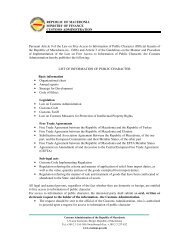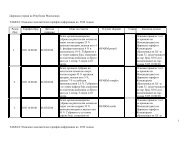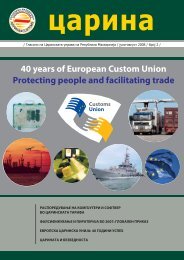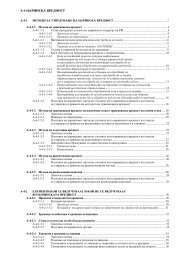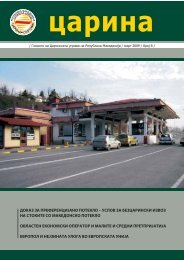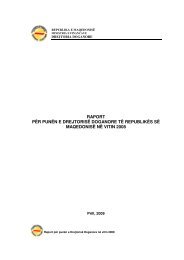REGIONAL COOPERATION AND ECONOMIC INTEGRATION
REGIONAL COOPERATION AND ECONOMIC INTEGRATION
REGIONAL COOPERATION AND ECONOMIC INTEGRATION
Create successful ePaper yourself
Turn your PDF publications into a flip-book with our unique Google optimized e-Paper software.
the implementation of the protocol on the cumulation of product origin in the region. This<br />
Agreement also brings a much clearer definition of trade rules than was the case with the<br />
previous 32 bilateral free trade agreements. Also CEFTA 2006 brings a new, more efficient<br />
dispute-resolution mechanism (consultations, recommendations of the Joint Committee,<br />
mediation, arbitration, the WTO mechanism) protects against arbitrary measures, which<br />
increases legal security in mutual trade.<br />
One of the more important issues is the so-called diagonal cumulation of origin. In practice,<br />
this originally meant that all CEFTA countries could export their products to the EU market<br />
duty-free. However, under “own products” were classified only products in which the share<br />
of domestic added value was more than 50%. Thus, a product that had 40% Chinese, 45%<br />
Serbian, and 15% Macedonian added value was an essential expatriate, i.e. without a defined<br />
origin, which means that it did not have preferential treatment vis-à-vis the EU. From now<br />
on, however, with the advent of the CEFTA agreement, the cumulation of Serbian and<br />
Macedonian added value would be allowed. This is very important, especially for textile<br />
manufacturers, where, for example, the cotton is imported from Egypt, the fabric produced<br />
in Serbia, and the shirt sewn in Bosnia.<br />
Facilitates the introduction of modern and stable conditions for the regulation of trade<br />
in the region, including new areas; demands strict respect of WTO rules, and provides<br />
WTO accession support for the countries that are not yet members (Republic of Serbia and<br />
Bosnia and Hercegovina). This practically implies that even before WTO membership,<br />
the systemic setting of the economy should be adjusted to WTO rules, representing a<br />
strong factor of predictability and transparency for foreign partners, foreign investors and<br />
entrepreneurs themselves.<br />
CEFTA 2006 facilitates the process of integration into the EU through harmonization with<br />
the legal structures and standards of the EU. The Union supported and emphasized the<br />
signing of CEFTA 2006 as one of the priorities of its regional policy vis-à-vis the Western<br />
Balkans; free trade in the region, by way of a single agreement, is mentioned as one of the<br />
conditions in the draft Stabilization and Association Agreement between Serbia and the<br />
EU. As additional confirmation that CEFTA is good preparation for accession to the EU<br />
stands the fact that Slovenia, Poland, the Czech Republic, Slovakia, Hungary, Bulgaria and<br />
Romania, as CEFTA members, became full-fledged members of the EU; of course, this was<br />
neither the only nor the most important prerequisite.<br />
Prior to CEFTA 2006, relations between countries in the region were partial, i.e. not all the<br />
countries had active political and economic relations. This agreement can be an instrument<br />
of economic and, subsequently, political stabilization. As a whole CEFTA 2006 agreement<br />
sends a positive signal that the region is constructing an attractive and stable environment<br />
for business.<br />
2. Shortcomings of CEFTA 2006<br />
CEFTA-2006 TRADE <strong>COOPERATION</strong><br />
As one of the blocs with the smallest territorial scope, CEFTA has a relatively high gross<br />
domestic product (GDP) and could, in that sense, represent a relatively important bloc.<br />
Still, since this alliance is only a transitional step toward the EU, its short-term character<br />
limits it in the political sense.<br />
119



